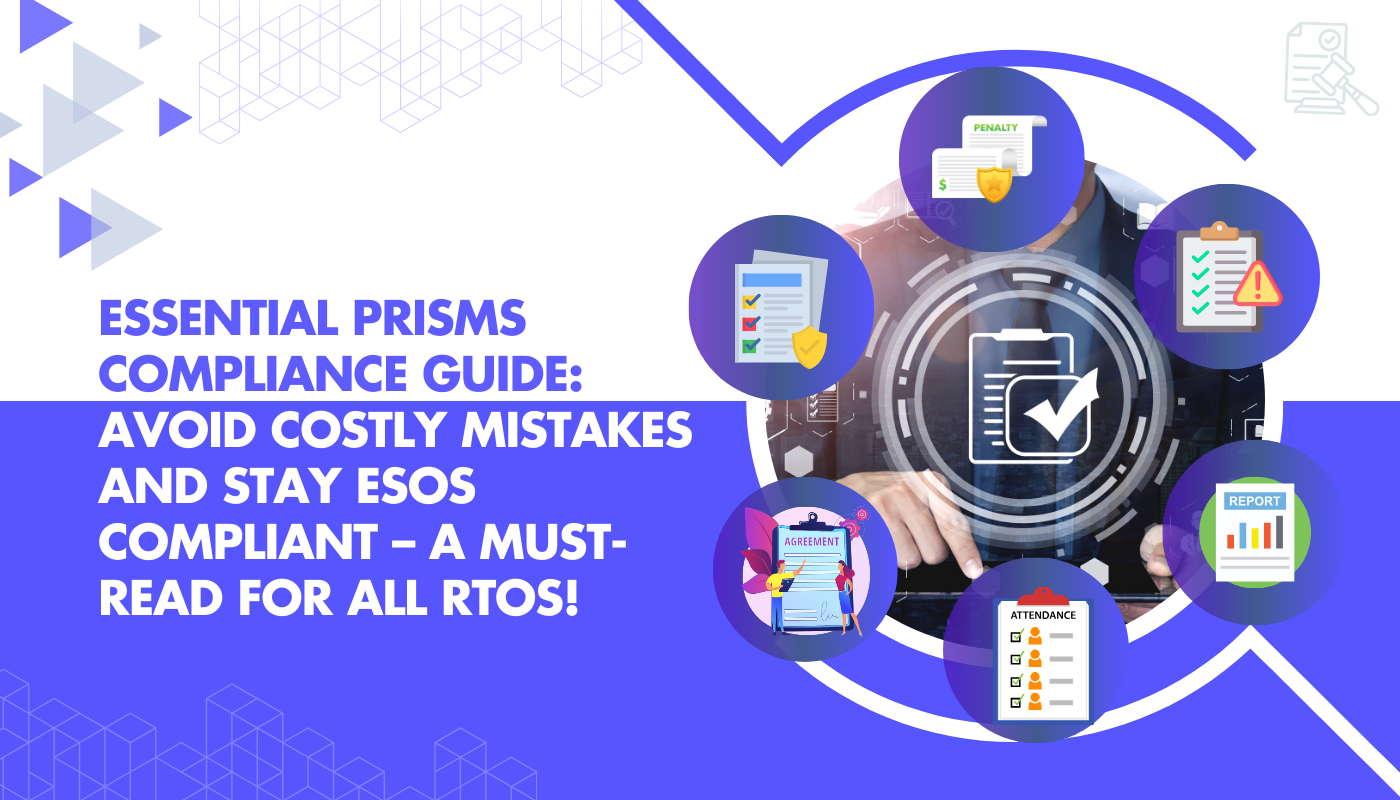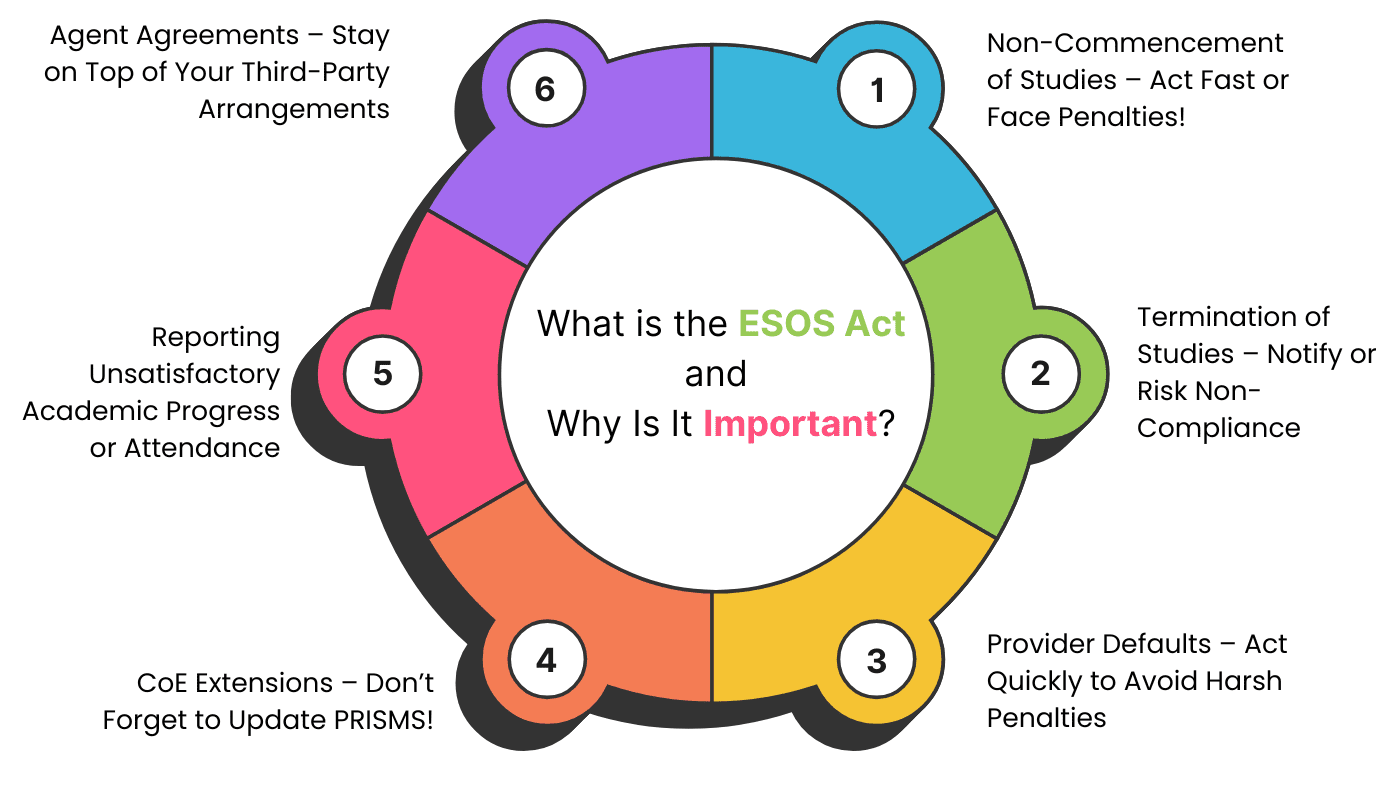
Managing international students comes with immense responsibility, and one key area RTOs must not overlook is PRISMS reporting compliance. What is ESOS? The ESOS (Education Services for Overseas Students) Act 2000 sets out the legal framework for providing education to international students in Australia. Failing to meet your obligations under this act can lead to serious legal consequences, financial penalties, and reputational damage.
In this blog, we’ll break down the most common PRISMS breaches, how to avoid them, and what is ESOS Act requires of you. Whether you’re dealing with non-commencement, provider defaults, or managing agent agreements, this ESOS guide is a must-read to ensure your RTO stays compliant.
The Education Services for Overseas Students (ESOS) Act 2000 is a crucial piece of legislation that protects the rights of international students and ensures education providers meet strict standards. The PRISMS (Provider Registration and International Student Management System) platform is where RTOs must report student enrolment data to remain compliant.
Non-compliance with the ESOS Act can lead to heavy penalties or even cancellation of your CRICOS registration. This means losing your ability to recruit international students—an outcome no RTO wants.

Section 19(1)(c) of the ESOS Act mandates that RTOs must report to PRISMS within 31 days if a student fails to commence their course by the specified start date. This is known as non-commencement.
RTOs often fail to report non-commencement on time, leading to costly penalties.
An RTO had several students who did not show up by their course start date. The compliance officer was unaware of the 31-day reporting requirement. ASQA flagged this during an audit, resulting in a compliance breach and fines.
Under Section 19(1)(d) of the ESOS Act, RTOs must report if a student’s enrolment is terminated (e.g., withdrawal, deferral, or cancellation). You have 31 days to make this report in PRISMS.
Delays in reporting withdrawals or cancellations.
A student cancelled their enrolment mid-course, but the RTO didn’t report this until the next semester. This 4-month delay led to a significant compliance breach, flagged during an ASQA review.
When an RTO defaults—failing to deliver a course or continue it—you must act fast. Section 46B of the ESOS Act requires you to notify the ESOS agency and TPS Director within 3 business days.
You must include:
Not reporting provider defaults promptly.
An RTO shut down one of its campuses due to unforeseen financial issues. They missed the 3-day reporting window and faced penalties, plus a reputational hit for failing to inform students properly.
A Confirmation of Enrolment (CoE) may need to be extended if a student requires more time to complete their course. Section 19(1)(e) of the ESOS Act requires RTOs to report these changes within 31 days (or 14 days for students under 18).
Failing to update PRISMS when extending a student’s course duration.
An RTO allowed a student to extend their CoE but forgot to update PRISMS. The student’s visa expired, and the RTO was flagged for non-compliance, causing visa complications for the student.
Under National Code Standard 8, RTOs must monitor students’ academic progress and attendance. Section 19(2) of the ESOS Act requires you to report unsatisfactory academic progress or low attendance in PRISMS.
RTOs often fail to report poor performance, leading to compliance issues.
A student was underperforming and not meeting attendance requirements, but the RTO did not report this to PRISMS. An audit revealed the oversight, resulting in a breach under Section 19 and Standard 8.
Section 21A of the ESOS Act requires RTOs to maintain a current list of all their agents and publish it on their website. If you enter or terminate a third-party agreement, you must notify ASQA within 30 days through asqanet.
Failing to keep your list of agents up-to-date or notifying ASQA late.
An RTO had an active agreement with an agent but failed to update their list for 6 months. During an ASQA audit, this oversight led to a penalty and strict warning for future compliance.
To ensure ongoing compliance with PRISMS reporting and the ESOS Act, RTOs should adopt several practical strategies. Below are key steps your RTO can take to avoid common PRISMS breaches:
Having a clear, well-documented PRISMS compliance policy is crucial for managing international student enrolment data. Your policy should outline the processes, responsibilities, and deadlines for reporting in PRISMS, ensuring consistency across your RTO. This policy should cover:
Action: Review your current PRISMS-related policy. If your RTO doesn’t have one, create a comprehensive policy immediately. If you already have a policy, ensure it is updated regularly to reflect any changes in regulations or internal processes.
A well-trained team is your RTO’s first line of defence against PRISMS compliance breaches. Staff responsible for handling PRISMS data must understand the ESOS Act’s requirements and the importance of accurate, timely reporting.
Action: Develop a structured training plan that includes initial, ongoing, and role-based training. Make sure staff are regularly updated on any changes in PRISMS reporting requirements.
Conducting spot checks and internal audits is a proactive way to catch issues before they lead to non-compliance. Spot checks can help identify incorrect or delayed data entry, while audits ensure ongoing adherence to PRISMS reporting standards.
Action: Schedule monthly spot checks and quarterly audits in your compliance calendar. Ensure that any issues identified are documented and corrected immediately, with feedback loops for continuous improvement.
Suggested Read: How Vocational Training Can Help Bridge the Skills Gap in Australia
Q: What happens if I miss a PRISMS reporting deadline?
A: Missing reporting deadlines can lead to penalties, warnings, or even suspension of your CRICOS registration. Always aim to report within the required timeframes to avoid compliance breaches.
Q: How can I ensure accuracy in PRISMS reporting?
A: Implement automated systems that sync with PRISMS and ensure double-check procedures for data entry. Regular internal audits can also catch errors early.
Q: What should I do if a student defers their course?
A: If a student defers, report the change in PRISMS within 31 days. Make sure the updated CoE reflects the new course dates accurately.
Q: How often should I audit my PRISMS entries?
A: Regularly audit your PRISMS data at least once a month to ensure all student details, defaults, and course changes are accurately reported.
Don’t let PRISMS reporting slip through the cracks! Ensuring compliance with the ESOS Act is critical to your RTO’s success and reputation. By staying on top of your reporting obligations, conducting regular audits, and automating key processes, you can avoid costly mistakes and ensure the smooth running of your operations.
If your RTO is struggling with PRISMS compliance, consider reviewing your internal processes today to avoid non-compliance tomorrow. Staying compliant protects both your business and your students’ futures!
Disclaimer:
The information presented on the VET Resources blog is for general guidance only. While we strive for accuracy, we cannot guarantee the completeness or timeliness of the information. VET Resources is not responsible for any errors or omissions, or for the results obtained from the use of this information. Always consult a professional for advice tailored to your circumstances.
Ben Thakkar is a Compliance, Training, and Business specialist in the education industry. He has held senior management roles, including General Manager, with leading Registered Training Organisations (RTOs) and Universities. With over 15 years of experience, Ben brings extensive expertise across audits, funding contracts, VET Student Loans, CRICOS, and the Standards for RTOs 2025.
Ben Thakkar
By submitting this form, you agree to the VET Resources Privacy Policy.